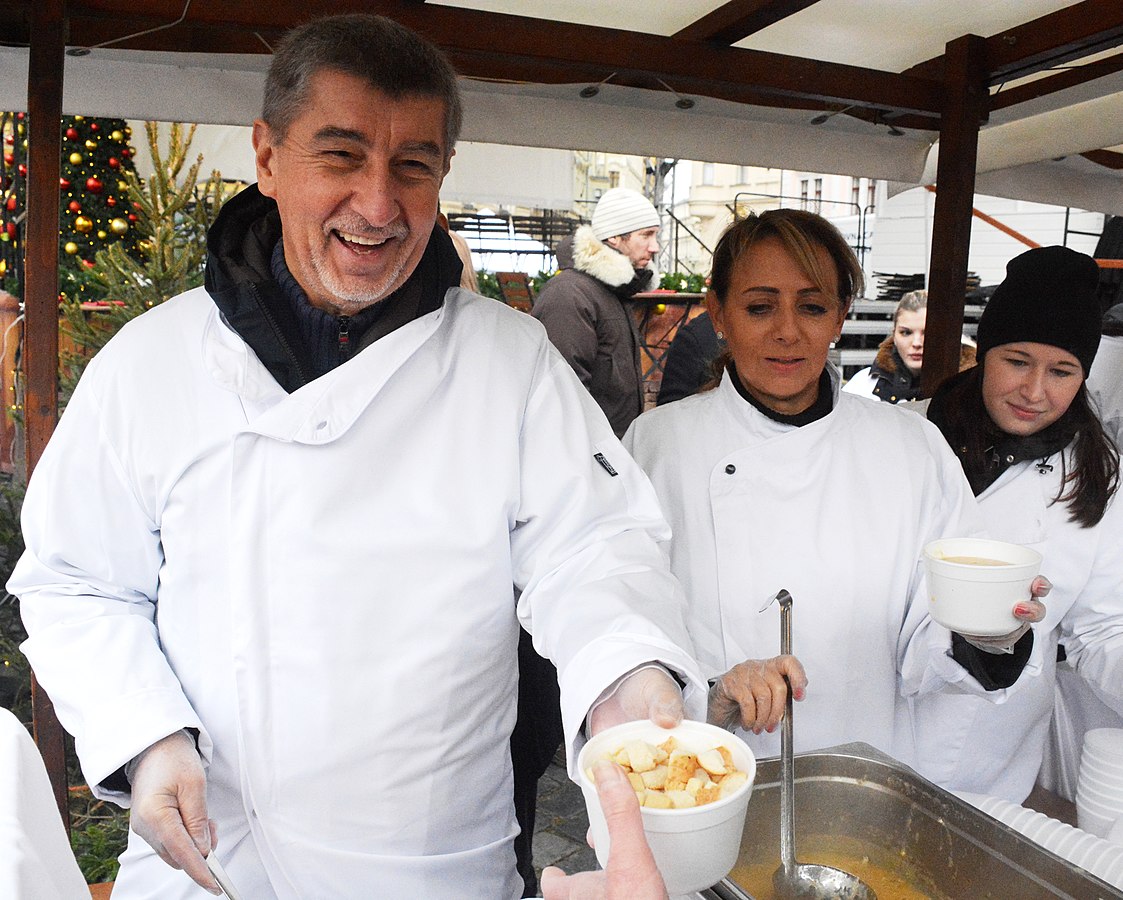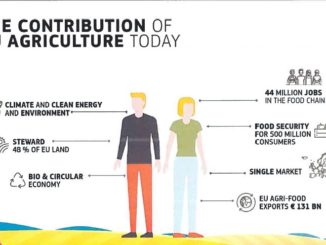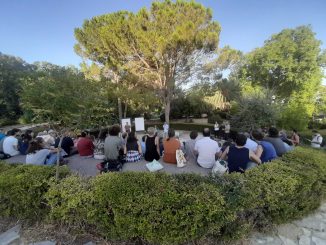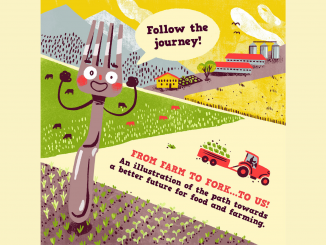
By Louise Kelleher in the Czech Republic. Additional reporting by Oliver Moore in Ireland.
The Czech chicken industry is under the wing of a Godfather. The same man is also milking the domestic dairy sector and has the nation’s encased meats all sewn up. Or, at least that was the case until he became Prime Minister. Now however, with a confidential European Commission report concluding Andrej Babiš has a conflict of interest between his business and his political role, we ask – are Andrej Babiš’ chickens coming home to roost?
Babis, Big Farming and political power
Andrej Babiš is often referred to as the Czech Trump. Shortly before being appointed head of government last year he was forced to relinquish ownership of Agrofert, a conglomerate of 230 companies covering agriculture, food and chemicals. There he made his fortune, and he has ceded control – on paper, at least. But Babiš remains the face of Big Food in Central Europe. Critics accuse the tycoon of stamping out small farmers and maintaining a stranglehold over the agricultural supply chain.
Babiš has been plagued by controversy since he entered politics. In recent weeks a fresh scandal erupted that has brought tens of thousands of Czechs to the streets calling for his resignation. With boycotts of Agrofert products proving a popular means of protest against Babiš, many Czechs are coming to the conclusion that Big Farming and Big Food are bad news.
Speaking to an estimated ten thousand protesters gathered on Prague’s Old Town Square on November 23, after Andrej Babiš had scraped through a no-confidence vote earlier that day, documentary filmmaker Apolena Rychlíková warned (speech starts at 2:16:28 – in video below) that the PM’s strongman approach and disregard for the law was “drastically and irreversibly damaging the soil, and the country as a whole.”
https://www.facebook.com/milionchvilek/videos/326906458128544/
In her critique of Babiš she spoke of the poor working conditions in an Agrofert owned chicken processing plant exposed by her award-winning film The Limits of Work (2017).
“Our country is not flourishing,” she declared to a cheering crowd, citing the words of the late dissident icon Václav Havel in his 1990 landmark address as the first post-Communist president. The symbolism was not lost on the anti-Babiš demonstrators. Under Communism the policy of collectivization effectively wiped out small farmers.
In the wake of the Velvet Revolution, when anything was possible in the “Wild East” of the 1990s, Andrej Babiš saw a business opportunity. He founded Agrofert in 1993 as a fertiliser business and the company expanded into agricultural commodities and agrochemicals the following year. Over the next two decades Agrofert ploughed through a dizzying programme of mergers and acquisitions, soon expanding into neighbouring countries to become a multinational conglomerate with interests spanning the agricultural supply chain, from seeds and fertilisers to farm machinery, pesticides, livestock, and food processing.
Documenting the case against Babiš
A documentary released last year, Selský rozum (2017), reveals Agrofert’s devastating effect on Czech farming. The film chronicles the conglomerate’s “systematic destruction of farming homesteads” through hostile takeovers and the squeezing of small farmers.
It tells the story of farmer Bohumír Rada who claims Agrofert caused his livestock business to go bankrupt. In the film Rada recounts that a subsidiary of Agrofert, the smoked meat producer Kostelecké Uzeniny, became the main buyer of his produce, before squeezing the business to the point of insolvency. When the value of the business hit rock bottom in 2011, Agrofert bought it out. Tensions escalated in 2015 when a crop sprayer entered a field Rada claims he owns and destroyed his wheat crop with herbicide. Rada’s son was injured in the ensuing fracas. The family took Agrofert to court over the incident but lost their legal battle earlier this year. Babiš for his part asserts he rescued a business that was on its knees and that Agrofert is the owner of the disputed field.
Agrofert’s monopoly of the Czech rapeseed sector is the focus of Žlutý baron (The Yellow Baron), a book by investigative journalists Zuzana Vlasatá a Jakub Patočka that was released last year in conjunction with the Selský rozum documentary. The book details how Agrofert created a climate of fear for farmers, pressuring oilseed rape growers to rely on fertiliser-intensive methods, which in turn increased Agrofert’s fertiliser sales. The oilseed rape would then be bought up by another Agrofert subsidiary for the production of biofuels, while capitalising on the EU subsidies and tax relief available for biofuels.
Babiš’ “conflict of interest” – the European Commission’s Confidential Report
The current controversy surrounding Babiš centres on a fraud investigation for alleged misappropriation of EU funds on the part of another Agrofert venture. The scandal took a bizarre twist in recent weeks with claims from Andrej Babiš Jr., the premier’s son and a central figure in the OLAF investigation – that he was abducted on his father’s orders. Babiš denies any wrongdoing, as does Agrofert, pointing to a Czech police investigation that found no evidence of kidnapping.
According to a poll last month more than two-thirds of voters believed the Czech Prime Minister’s business interests represent a conflict of interest. Popular sentiment has been vindicated in recent days as the European Commission’s legal service concluded that Andrej Babiš has a conflict of interest between his role as head of the Czech government and his business dealings. This is because he is in charge of both negotiating and implementing EU funds, and personally benefited from these funds.
The Guardian reports that “the taxpayers of the Czech Republic face being asked to repay at least some of the €82m paid to Agrofert in 2018, but the final bill could be much higher,” due to ongoing investigations into EU grants.
According to Co-President of the Greens/EFA group in the European Parliament, MEP Philippe Lamberts, “Mr Babiš cannot be allowed to remain both a beneficiary of Agrofert and head of the Czech government, he must sever any financial ties to Agrofert from which he might benefit from through his role as Prime Minister. All EU funds going to the Agrofert group must be suspended immediately, pending a full investigation. The European Commission should now publish all the documents related to Mr Babiš’s case and explain exactly what steps they intend to take to remedy this outrageous situation.”
He adds: “The Commission claims that it is up to national authorities to deal with such conflicts, but how realistic is it that Czech civil servants would be able to rule against their own PM? This is European Union money distributed through European Union policies and it must be up to the European Commission to take responsibility and resolve this conflict of interest. The Greens/EFA group have demanded a debate in the European Parliament and will ensure that the Commission fulfils its duty as guardian of the EU treaties to prevent such shocking abuses of power.”
Full film Selský Rozum below
https://www.youtube.com/watch?v=REHoW5fDerI





